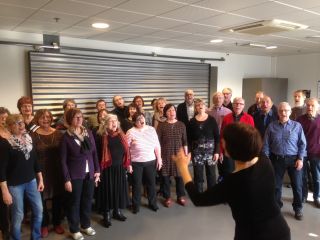By Emmi Pentikäinen
While aging can be a life period characterized by vitality, happiness, and well-being, it is all too often also accompanied by a gradual decline in cognitive functions, which can cause significant individual distress, severely impact everyday functioning and quality of life, and, in some cases, hail the onset of dementia. Aside from memory, executive functions, such as the flexible shifting of attention and working memory updating, are among the most affected cognitive abilities in aging, due to the structural and functional degenerative changes occurring in the prefrontal brain regions. Executive functions are needed to successfully navigate our daily lives, especially in today’s world characterized by floods of information and the demand for continuously staying on top of the changing environment.
Interest in the potential benefits of musical activities in promoting cognition in aging has surged during the past 20 years, fueled by neuroscientific advances in uncovering the neural mechanisms of music and also by the ever-growing number of older adults participating in musical hobbies. Currently, there is converging evidence that musical interventions are promising tools to support cognitive function and maintain brain health in older adults. However, most of this research has looked into the effects of instrumental musical activities, while singing has received less attention, even though it has many elements (auditory, vocal–motor, verbal, cognitive, affective, social) that may promote cognition and well-being in aging. Neuroimaging studies have shown that singing production activates an extensive network of bilateral (left and right hemisphere) frontal and temporal regions as well as limbic and cerebellar regions, which are known to be affected also by the neural aging process.

Senior choir practicing in Helsinki, Finland.
Photo by author.
Singing Together for Mental Health
Choir singing is a popular activity among older adults, and senior choirs are booming in many countries with aging populations. Choir singing is relatively easy to arrange when compared to instrumental musical activities or other interventions, and it involves a group of people simultaneously using their own voice as the instrument. Socioemotionally, choir singing enables feeling and expressing of emotions, aesthetic enjoyment, and enjoyable social interaction, which brings a feeling of togetherness and connectedness and provides peer support. Previous studies have shown that choir singing interventions can reduce anxiety, depression, and loneliness as well as improve quality of life and social participation. In terms of aging, these are important findings as many older adults struggle with feelings of loneliness, depression, and social isolation, which may also precipitate cognitive decline and onset of dementia.
What About Cognition?
While the socioemotional elements may be the driving force for participating in choir activity, there are also many cognitively stimulating elements to choir singing. Cognitively, choir singing provides a perceptually demanding environment where surrounding voices need to be continuously monitored and one’s own vocal production adjusted to them, while at the same time following (or retrieving from memory) the melody and lyrics of the songs, focusing on the choir conductor and other performance elements, and maintaining attention and vigilance across the performance. This all requires a degree of cognitive flexibility and endurance. However, research on the potential cognitive benefits of choir singing in older adults has thus far been scarce, although it is continually increasing, and relatively little is still known about its effects on attention, executive function, and memory as well as on neural information processing in the brain.
Longitudinal Study of Choir Singing
Recently, we conducted a longitudinal study at the University of Helsinki, Finland, examining the possible benefits of regular choir singing on older adults’ well-being. In this study, 107 older adult choir singers and 62 demographically matched nonsingers were repeatedly assessed using neuropsychological tests, questionnaires, and auditory electroencephalography (EEG) measurements over a 2-year period.
In the EEG part of the study, we found in the baseline measurements that choir singers showed larger mismatch negativity responses to changes in combined pitch and location sound features and smaller N1 responses to the repeating pitch and location features in left frontotemporal areas compared to nonsingers. These findings indicate that, in the aging brain, choir singing is associated with enhanced encoding of complex auditory regularities and more effective adaptation to simple sound features—all crucial elements for managing in the perceptually and cognitively demanding choir environment.
In the neuropsychological part of the study, we observed better baseline performance in choir singers in a phonemic fluency task compared to nonsingers. This task measures verbal flexibility, such as flexible use of search strategies for semantic information and fast verbal production, which is closely linked to executive functions. Interestingly, better performance in this task correlated with the enhanced encoding of complex auditory regularities observed in the EEG. We did not, however, observe any benefits of choir singing on other cognitive domains, such as in attention or memory function.
In the longitudinal results, choir singers maintained their better verbal fluency performance over the 2-year follow-up, but the difference between choir singers and controls became smaller. Performance in this task is often seen to decline with increasing age. Additionally, choir singing was associated with some longitudinal benefits in a vocabulary task measuring active retrieval of word knowledge, but this result was less conclusive.
In addition to these results, we also observed some psychosocial benefits of choir singing, specifically in social integration, environmental quality of life, and general health.
Conclusions and Future Directions
The results indicated that choir singing can benefit verbal flexibility in healthy older adults, a finding that is supported by previous research on the effects of group singing and instrumental musical practice. The connection between better phonemic fluency performance and enhanced encoding of complex auditory regularities in EEG suggests that choir singing may potentially induce brain plasticity in frontal regions that benefits these functions. While these results are encouraging, more longitudinal research is still needed to better understand the possible long-term effects of choir singing on aging cognition.


















+ There are no comments
Add yours